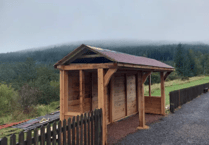A plaque commemorating the Brecon connection to a 17th Century slave trader has been removed after finding its way onto a list of more than 60 targeted memorials or statues across Britain.
Although Brecon Town Council had already agreed to a review of the plaque, which is at the town’s Captain’s Walk, action was taken by an unidentified person before any decision about its future could be taken.
The plaque, which was paid for by the town council, was unveiled 2010 and commemorates slave ship captain Captain Thomas Phillips who lived in the town.
Before his time in Brecon, Captain Phillips was at the helm of the slave ship The Hannibal, made infamous by its disastrous voyage of 1694 which saw more than 300 enslaved men, women and children die on the journey from Africa to the Caribbean.
Despite his connection with the slave trade Captain Phillips wrote frequently of his growing distaste for the slave trade, saying that no-one should be discriminated against for the colour of their skin - and it is for these ‘liberal remarks’ that he is commemorated in Brecon.
Speaking in 2010 when the controversial £600 plaque was first unveiled, a spokesman for the town council said, “The environment committee of this town council is not commemorating Captain Thomas Phillips’ 12-month period as a commander of a slave ship.
“We are commemorating the fact that in his journal of his voyage written in the 1690s, he was one of the first recorded persons of his time to make such liberal remarks on race when he wrote,
‘I cannot imagine why they should be despised for their colour seeing what they cannot help and the effect of the climate God has given them. I cannot think there is any basic value in one colour more than another, nor that white is better than black, only we think so because we are so.’
“The initial idea was to provide a bench for visitors to the town who wished to visit the area near to Captain Phillips’ house.
“Because there was no signage to signify the Captain’s Walk, a plaque and fixing was also ordered.
“The cost of the Welsh Slate plaque and fixing was £600. The cost of the bench was £300, both were made locally and we sited the bench as it is located on an 1888 map of the town.
“To suggest that this town council or anyone would wish to commemorate the slave trade is beyond any sensible belief.
However, critics have long argued that ‘a few remarks’ are disproportionate and disrespectful to the many slaves who died aboard his ships and this week the plaque was highlighted on a list of more than 60 monuments across the UK which campaigners say should be removed.
An online petition is also in place which calls for the plaque to be replaced with something ‘more appropriate’.
“The plaque we propose would bring recognition to those he enslaved and the fact that this abhorrent practice happened and should not be glossed over,” said campaigner Jamie Tobin.
“It will be placed to educate people of what really happened and to act as a memorial to the generations of humans that have suffered directly because of slavery. We must recognise and be conscious that our town benefited from the enslavement of people and although we cannot change history we also can not evade it.
Despite the protest Mr Tobin says that those behind the online petition do not condone the manner in which the plaque has been removed.
“When the time comes, however, to fill the space of the removed plaque let it not be a repeat of history,” he added.
A spokeswoman for Brecon Town Council said: "Brecon Town Council stands against racism and discrimination. We are proud of our town’s diversity and we celebrate and defend the cultural heritage of all our citizens.
"Earlier this year, the town council committed itself to review the plaque located on Captains Walk which noted Captain Thomas Phillips’ connection to the town.
"Work to remove or review the plaque was unfortunately delayed due to the coronavirus pandemic.
"As the plaque has now been removed before the town council could complete its work, the town council, in consultation with the local community and interested parties will take time to consider what, if anything, should take its place."
See more on this story in next week’s B&R





Comments
This article has no comments yet. Be the first to leave a comment.